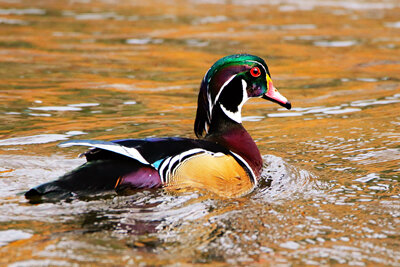
Photo courtesy Charles Martinez
This week’s Bird of the Week, compliments of the Weminuche Audubon Society and Audubon Rockies, is the wood duck.
We don’t get to see wood ducks often here, but what a treat when we do. When one spent a few days recently on the river in town, gorgeous, beautiful, incredible and awesome were adjectives used on ebird reports to describe it. This male on the river treated us to close views when he hung out near the shoreline.
Almost every feather on the male has an intricate pattern of color that is iridescent in sunlight. His boxy-shaped crested head and mane are glossy green cut with white stripes. Feather colors on his body show chestnut, purple, browns and shades of blue. Both the bright red eyes of the male and the white teardrop patch around the eyes of the brownish female confer a startled look.
True to their name, wood ducks are at home high in trees near water. Their webbed feet are tipped in strong claws that allow them to grip bark and perch on branches. Their wings and tails are shaped for navigation through the woods. These are cavity-nesting ducks who cannot hollow out a hole and prefer trees which are over or close to water. Cavities used are often in trees where the heartwood is rotted and a hole exists where a branch broke off.
Incubation and raising of young falls on the female. One day after the young have hatched, the mom waits below the nest and calls “jump.” Nest cavities may be very deep and hatchlings use their clawed feet to crawl up the inside and perch at the hole before jumping 50 feet or more to the ground or water below.
Wood ducks are omnivores that dabble for aquatic plants and seeds, insects, snails, tadpoles and salamanders. They most often inhabit water around the edges of swamps, sluggish streams, beaver ponds or marshes fringed with woods. If aquatic resources are scarce, they forage on the forest floor for nuts, or for grains in fields. Acorns are a favorite food.
Once headed toward extinction due to uncontrolled hardwood deforestation and market hunting, wood ducks are now one of the species that is a conservation success story due to wetland and waterfowl protections.
For information on events, visit www.weminucheaudubon.org and www.facebook.com/weminucheaudubon/.